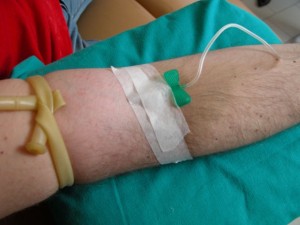When a victim first learns he or she has a malignant mesothelioma, there is often very little time to reflect on the diagnosis. The patient is normally told he or she have very little time left to live – in many cases, this means a matter of months or less than a year.
 The mesothelioma patient can elect to have treatment, but this is a hard decision. Most treatment options are able to extend a patient’s life for anywhere from a matter of months to even a year or two, but this extension comes at a big cost – not only in terms of dollars (which happens to be quite expensive), but also in terms of pain and suffering. If a mesothelioma victim elects not to undergo treatment, he or she will essentially be given painkillers and breathing aids and placed in a hospice type status for the duration of his or her life.
The mesothelioma patient can elect to have treatment, but this is a hard decision. Most treatment options are able to extend a patient’s life for anywhere from a matter of months to even a year or two, but this extension comes at a big cost – not only in terms of dollars (which happens to be quite expensive), but also in terms of pain and suffering. If a mesothelioma victim elects not to undergo treatment, he or she will essentially be given painkillers and breathing aids and placed in a hospice type status for the duration of his or her life.
On the other hand, if a patient elects to undergo treatment, this will involve highly invasive procedures, such as chemotherapy, radiation, and surgery. In one common treatment plan, a large section of the tumorous organ is dissected, and a warm chemotherapy wash is applied directly to the site of the tumor in an open surgical procedure. With these painful procedures, there is no chance of a recovery or the tumor going into remission unless a medical miracle occurs, and doctors are usually trying to slow tumor growth and extend life for a matter of months or a few years at best.
For this reason, doctors and researchers are constantly working on new treatment options, and there are hopes that one day there will be a much more effective treatment option that can extend a mesothelioma victim’s life for many years following diagnosis.
According to a recent news feature in Cure Today, new immunotherapies are showing some promise in treating mesothelioma patients. The new treatment options use what are known as immune checkpoint inhibitors. As noted in the article, chemotherapy is the current treatment of choice for most mesothelioma patients, but the average survival period is between six and nine months, which is not a significant increase in one’s lifespan when compared to the pain and suffering caused by the treatment itself.
The Checkmate-032 study, one of numerous drug studies conducted, involved patients with single formulations of inhibitors and some patients with multiple formulations, as well as patients on conventional treatments. Some of these combinations showed an increased survival of 9 months in as many as 30 percent of patients. While this is far from a cure, it does show promise in a new line of therapy, and researchers hope that with additional studies, these numbers might be much better.
On another positive note, mesothelioma victims who were on the checkpoint inhibitors, experienced very little side effects, or adverse events as they are called in the pharmaceutical industry. It should be noted that when dealing with a highly aggressive deadly form of cancer like mesothelioma, the United States Food and Drug Administration (FDA) will often let pharmaceutical companies fast-track testing, and there is greater tolerance for side effects, since the patient is likely to die without treatment.
If you or a loved one is diagnosed with mesothelioma in Boston, call for a free and confidential appointment at (617) 777-7777.
Additional resources:
Immunotherapies Show Promise in Mesothelioma, Small Cell Lung Cancer, November 18, 2015, Cure, by Silas Inman
More Blog Entries:
Can Family of Asbestos Workers Sue for Illness?, September 15, 2014, Boston Mesothelioma Lawyers Blog
 Mesothelioma Lawyers Blog
Mesothelioma Lawyers Blog

